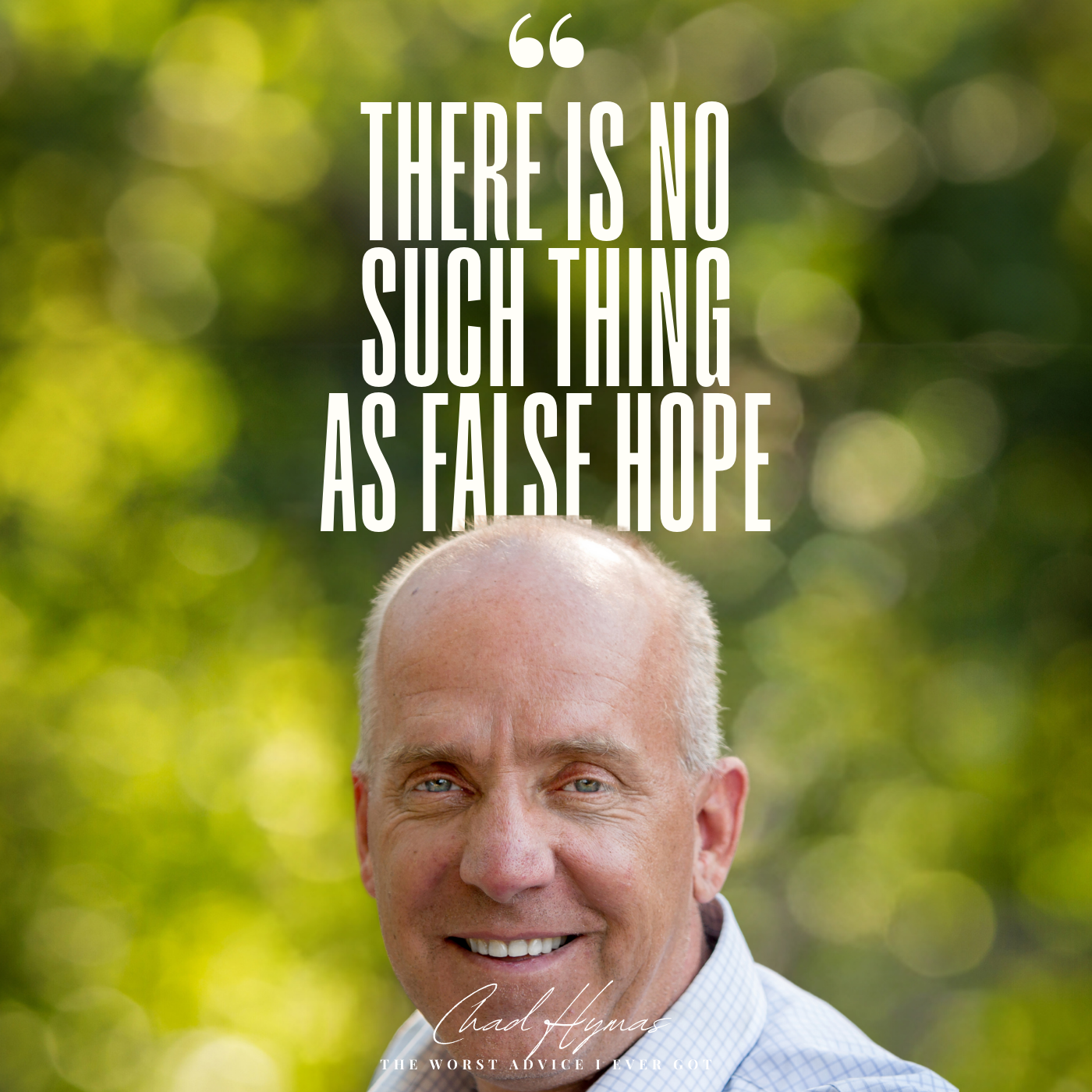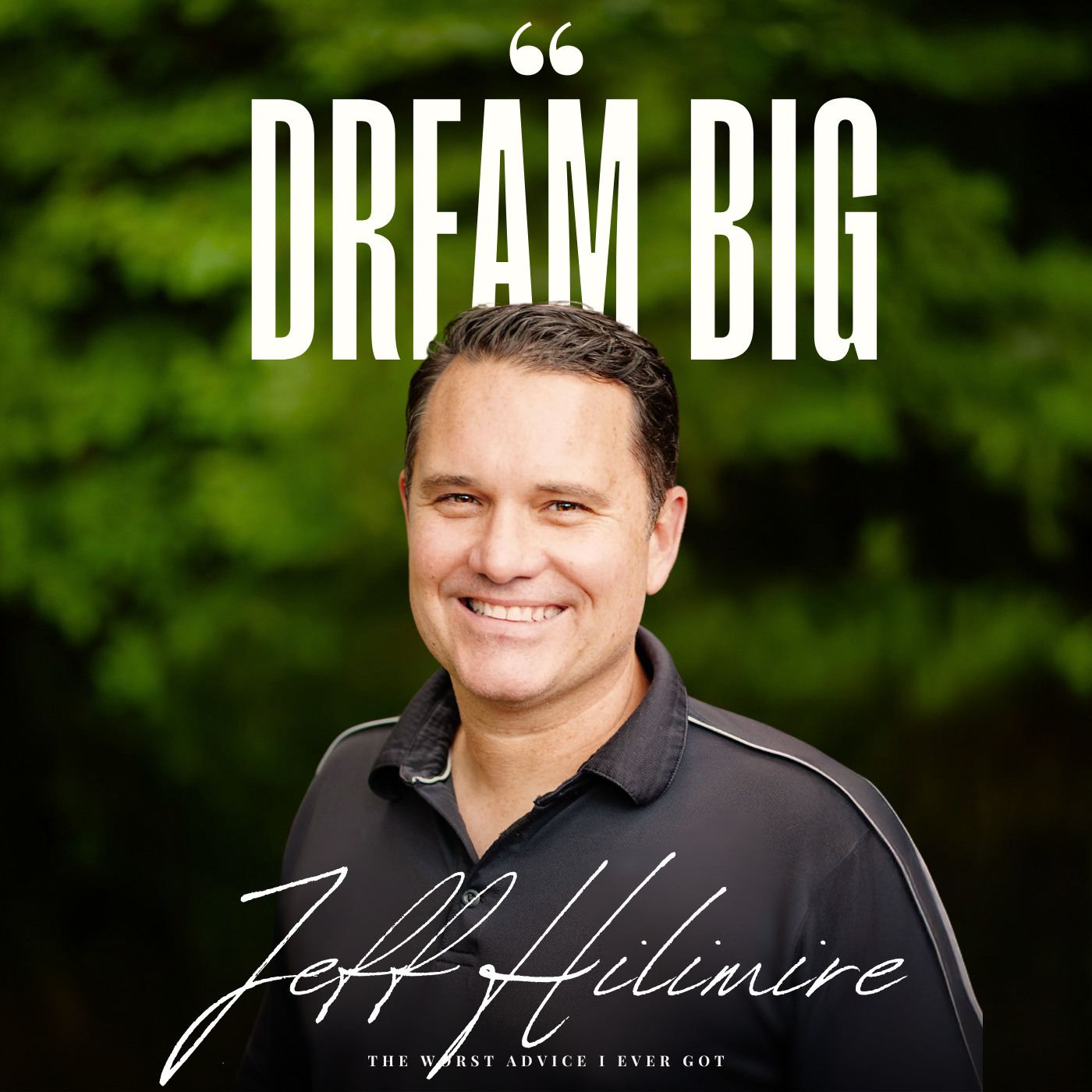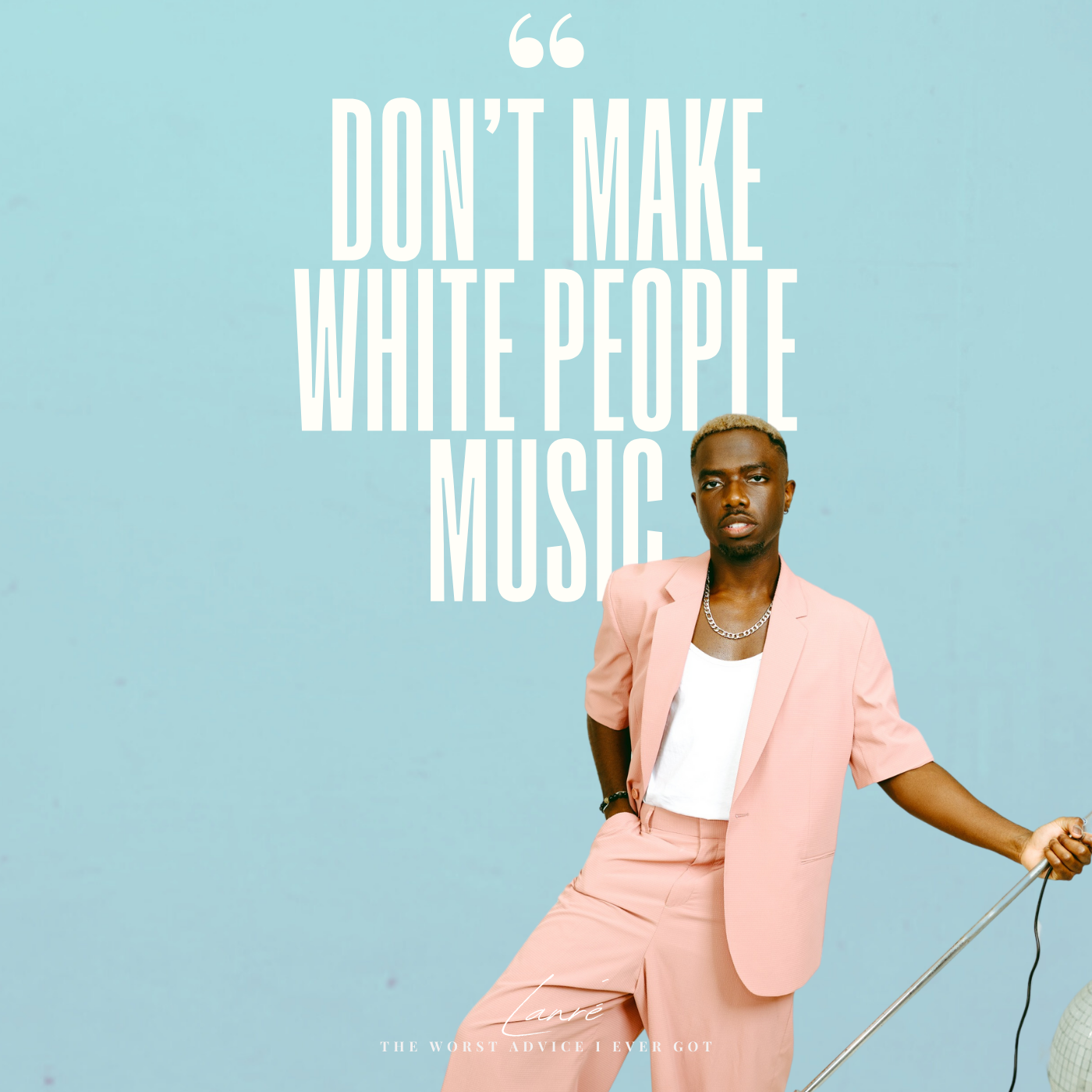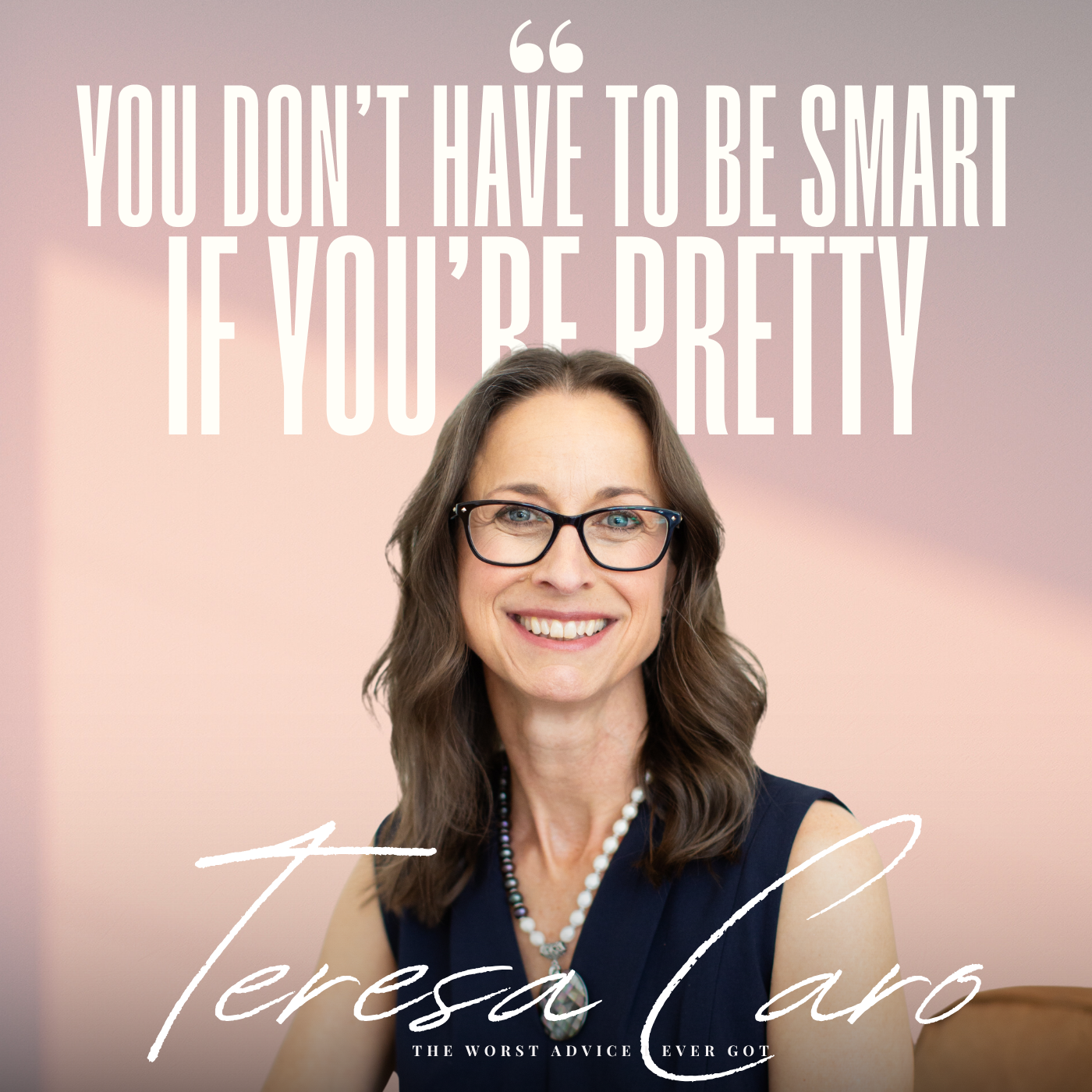Episode Transcript
[00:00:07] Speaker A: Hey, everybody, and welcome to the worst advice I ever got. I'm your host, Sean Taylor, joined by my producer, JB. And welcome to part two of our live audience taping.
Joining us today on the stage is Chad Hymas. Chad is an internationally acclaimed speaker, bestselling author, and passionate advocate for safety, awareness and personal empowerment.
Despite a life altering accident that left him paralyzed from the chest down, Chad's indomitable spirit and unwavering determination have propelled him to inspire audiences worldwide with his powerful message of resilience, leadership and purposeful living.
[00:00:46] Speaker B: Chad, thanks for joining us.
[00:00:47] Speaker C: My pleasure. Thank you.
[00:00:48] Speaker B: Thank you very much.
[00:00:49] Speaker C: My pleasure, Chad.
[00:00:50] Speaker B: We start each one of these podcasts with the same exact question.
[00:00:54] Speaker C: Yeah, I know, I heard it.
[00:00:57] Speaker B: So what is the worst advice you ever got?
[00:01:00] Speaker C: Well, I mean, which time?
I've been given bad advice many times.
Scuba diving was one. That was horrible advice.
I was placed in a stigma after being diagnosed with being a quadriplegic. But I think the worst advice when I was prepped for this, this podcast, and I've thought about it deeply, the worst advice that I've ever been given is that there is. There's no such thing as false hope. Interesting. So let me make sure there's no such thing as false hope.
And what I've come from that is that there's no such thing as false hope. Here's what I mean by that. For everything that we do know, we know a lot about technology.
We're gaining wisdom every day. People research, studies. For everything that we know, there is so much more that we do not. And tomorrow will be a better day. No matter what people's circumstances, financial, health, wellness, organizational, human development, whatever that might be, tomorrow will be a better day as long as they can maintain that level of hope, because there's a lot that we don't know, and that has helped me in strides. So I was given a sense of false hope. Chad, this is what people like you should expect. Chad, this is what happens to 83% of people that are married. In your circumstance, Chad, you're probably never going to be able to teach your kids how to do a layup again. They weren't doing that to be negative people. They were just trying to prep me for reality. When I decided that I create my own reality, no one else is going to dictate that for me.
[00:02:40] Speaker B: So this advice, these statements, people in their heart trying to prepare you for, I guess, the tough road ahead.
[00:02:49] Speaker C: In a good way. Yeah, in a good way, right? Yeah. Based on research. Yeah.
[00:02:53] Speaker B: History, things they've seen their experiences. This all happened shortly after your accident. Is that fair to say?
[00:03:00] Speaker C: And months and years after.
[00:03:02] Speaker B: So it continued.
[00:03:03] Speaker C: It still continues today.
[00:03:05] Speaker B: So despite your accomplishments, despite your ability to overcome those generalizations, I mean, people.
[00:03:11] Speaker C: Come up to me at the airport and they will say, this is how we need to get you on the airplane.
That's not the only. There are several right answers for me to get on an airplane, not just one. Yeah, Chad, we can't get you on this airplane. It's too small. Actually, I can get on any jet. I used to have somebody that's maybe a little stronger and put one person in the front, and we'll do a fireman lift. I don't need a Nile chair.
[00:03:31] Speaker D: Yeah.
[00:03:31] Speaker C: So there are several ways for me to put my pants on. Not just one. There are several ways for me to eat a piece of fish. Not one way. I'm just saying that it happens. It's been 22 years, and I get bad advice all the time because people are stuck on one way, the way they were taught. And I think the older we get, the harder it is to change. And we give advice based on that one way that we were taught, instead of opening up our mind to several different right ways to solve a single problem.
[00:03:58] Speaker B: That's interesting. So I guess it brings up the question of giving advice in general, because it always is, I guess, brought through our filters and our experiences. So how do we advise people if we need to remain open minded?
[00:04:13] Speaker C: I don't think there's anything wrong with advising people on experience. I don't think there's anything wrong with that at all. As long as you're willing to accept the fact that, hey, they might have another right answer, too.
[00:04:22] Speaker D: Yeah.
[00:04:22] Speaker C: You know, people all the time, they want a help, so they're gonna. They're gonna grab. They grab my upper body. They're gonna grab. Thinking that the upper body is where the weight is to get me into a vehicle. It's probably gonna happen here in three minutes, and I'll get some help. Well, the weight's not at the shoulders yet. They want help. They're grabbing the arm. Where's the weight at the weights? At the butt? At the hips. If you want to help, go into the butt. That's where the weight's at. I'm just saying that that's all the weight sitting there. And so I just. It happens daily. As long as you're open up to having an open mind, there's more than one way for me to shower. I don't have to shower. In a shower, in a tub. I can shower on any towel, floor. Just give me 15 towels, and I'll make sure the floor is clean.
[00:05:01] Speaker D: Yeah, yeah.
[00:05:02] Speaker C: I'm just saying there's several, several ways for me to ski, to snow ski, water ski, tube. And so I just. I think that it's okay to give advice, to your credit, to your question, give advice, as long as you're willing to understand that, hey, there might be a hundred other ways to do this, too.
[00:05:19] Speaker D: Yeah. Yeah.
[00:05:21] Speaker B: So you receive some of these messages, this false hope, but you're starting down a journey. And I know a little bit about this because you shared that with me earlier, just when your kids came in and saw you after you had been in a coma for a while. And you began this process, which you described in your own way as going through the motions, but then you began to fight. You began to resist these, I guess, stereotypes or generalizations of what to expect.
[00:05:47] Speaker C: Status quo.
[00:05:48] Speaker B: The status quo.
What were some of the challenges to that advice, to those recommendations, to that history and those experiences that you. Because it feels like they would just be more impediments to you, because you're on this incredibly hard and challenging journey to recover from your injuries, to live a life that you yourself describe as being the compass for someone.
How did you do that despite everyone telling you you shouldn't hope for that? Because it's a false hope.
[00:06:22] Speaker C: Very fair question to ask, and I think it's a brilliant question. I didn't do it in their house, and their house would be the fair. The therapy room. Right. So. So they're gonna come in, and they're gonna teach you based on their research and their studies in school, which is not. There's nothing wrong. They teach a lot of great things and a lot of new ways of doing things. But the truth is, I found out how to take care and do my own thing in my own wheel, in my own house after I got out. After I got out of the therapy again, I used a lot of what they taught, but I've also gone back and taught a lot of what I've learned to them, and now they're teaching that and that there are different ways. Uh, maybe I'll give you a quick personal example.
[00:07:02] Speaker D: Yeah.
[00:07:02] Speaker C: There would not be too many people out there that would agree with the concept or the method, methodology of how I use the restroom.
I straight cath, and I don't use gel, and I don't always. I'm not always. I'm in airports all the time, and I don't wear gloves, and I get urinary tract infections. Very, very little. How does that work?
I straight cath. There's not a tube hooked onto my body, and I don't wear a leg bag for bowels. I know we're being personal, but I'm just being real.
[00:07:35] Speaker B: Yeah, that's pretty.
[00:07:36] Speaker C: I'm being very, very, very real. I'm very, very authentic. Most, like me, are hooked up to a cosmi bag, or they're hooked up to some sort of. My body's on a clock, so they want me to eat to avoid getting bony. Right. I do not want to eat to avoid putting on weight and burning calories, and I need to be liftable based on my lifestyle that I've chosen to live. Right. And so we all get to make those. So when you start opening up the world to these broader pictures, you got to combat that with research and data. And research and data is only gained by what they're learning based on what the average does. Right? The average. That's where they're gonna get their research from. And I have. I am very, very bold and very, very forthright in my activist and activist being an activist towards being not average and being, you know, maybe benchmarking or setting new standards and challenging the status quo, which means you have to take risks.
[00:08:33] Speaker D: Yeah.
[00:08:33] Speaker C: You're gonna have to risk yourself. You're gonna have to risk your face. You're gonna have to risk being. Being, you know, criticized. But frankly, everybody's got a critic.
[00:08:42] Speaker D: Yeah.
[00:08:43] Speaker C: Even you have some. I mean, everybody's got a critic.
[00:08:45] Speaker B: I have lots of critic.
[00:08:46] Speaker C: Right. So I think it's okay to challenge those and just, you know, put it into perspective, and you just keep moving on and hanging around people that believe in you.
[00:08:53] Speaker D: Yeah.
[00:08:54] Speaker C: And when you do that, man, the doors just keep opening.
[00:08:56] Speaker B: Well, the people that believe in you. It's funny you say that, because I was thinking about that as my next point is. So when you're resisting what people are advising you, what you should expect, and you're saying, no, I'm going to be different. You can't do that by yourself, can you?
[00:09:10] Speaker C: Oh, I can't? Yeah, some might be able to. I I need to have some. I need to have some backing. I need to have somebody. I need to be able to bounce ideas off of people. I need to be able to say have. And I've got a dad that says, you know what, buddy? You can. What? We were taught this as a kid. Son, you want to be an astronaut? You can be an astronaut. Son, you want to fly? You can fly.
You know, people like me don't drive. I do. My vehicle's waiting at the airport.
I don't grip. I just. I've created a new device.
People have been watching me. I buttoned up a shirt with a little tool that I made out of a dowel at home Depot and some duct tape and a hanger that we cut off of that you hang clothes on. And, I mean, we just rig stuff up to make it work because it's not invented yet. I mean, there's. We just. We make things work.
[00:09:57] Speaker D: Yeah.
[00:09:58] Speaker A: So.
[00:09:59] Speaker B: And your main team that supports you, you mentioned your father, but I assume it would be your family. And then those that are closest to me.
[00:10:05] Speaker C: Yeah, I mean, yeah. And then I've got some really good doctors that have been educated that. That say, hey, chip, you know, what are you coming up with? What are you thinking of? What are you doing with the medication we prescribed? And how do you. How do you get rid of the balances? And how do you get rid of all that stuff? And so we just. We just work it out.
[00:10:22] Speaker D: Yeah. Yeah.
[00:10:23] Speaker B: So the worst advice you ever got.
[00:10:26] Speaker C: Was no such thing as false hope.
[00:10:28] Speaker B: No such thing as false hope.
[00:10:30] Speaker C: Only false hopelessness.
[00:10:31] Speaker B: Only false hopelessness. So I guess if you were to give advice to our audience as we wrap up today, I guess it would be in the realm of maintain hope.
[00:10:42] Speaker C: I think that's pretty simple.
[00:10:45] Speaker D: Yeah.
[00:10:45] Speaker C: Maintain. Maintain hope. And. And if you're wondering what that is, it's just that tomorrow will get better and that it's okay to be down. It's okay to have a bad day. It's totally fine to have a bad day. In fact, take the time to mourn that bad day. But don't stay there. Cause when you stay there, that's when you start believing that, okay, now I am the status quo. All right? I was just given prognosis of cancer. Four months. I'm gonna live four months. I guess I better start giving my stuff away. Are you joking me?
[00:11:18] Speaker D: Yeah.
[00:11:19] Speaker C: I mean, how many people. How many stories have we heard where people been given a problem, they live another 20. I just say. How many stories have we heard of that? A lot.
[00:11:26] Speaker A: A lot.
[00:11:27] Speaker C: I'm just saying. And it's not because they were given a different medicine. It's not because they took more chemo. I'm just saying. And it's not because the doctors don't know nothing or know everything. It's because I believe that people, they kind of dictate for themselves, and they go and they find purpose and place to. To give and to serve. And I'm not even saying it's a higher power. I believe that they're giving themselves this energy to keep moving and fighting and prolonging until they just can't go anymore. And I think that's admirable.
[00:11:58] Speaker B: It's more than admirable. It's something we should model for ourselves.
[00:12:02] Speaker C: Yeah. I believe the same way you do. I do.
[00:12:05] Speaker D: Yeah.
[00:12:05] Speaker B: Well, I can't thank you enough for being with us, Jason. This has been very, very insightful. Thank you so much.
[00:12:11] Speaker C: Thanks.
[00:12:12] Speaker A: Wow, JB, what an incredible guy. If you don't follow him on instagram, you should right now pull his instagram up, look at his story, and see how he lives his life. It is just unbelievably inspiring.
[00:12:26] Speaker D: Yeah.
[00:12:26] Speaker E: Obviously, we couldn't get into all of his background. We did a little bit in the intro, but, yeah, incredible story. Crazy accident, what happened to him. And I think most people would have absolutely not done half the things that he's done with his life now. And you're being generous.
[00:12:42] Speaker A: I wouldn't do one 100th of the things he had done if I went through what he went through.
[00:12:46] Speaker C: Right.
[00:12:46] Speaker D: Yeah.
[00:12:47] Speaker A: And you know what I took from this? JB is the worst advice he ever got, is advice he got a minute after, an hour, after, a day, after, a month, after, a year, after he still gets it today, is people just continue to put his hopes as falsehoods. They limit what he can do, and he just. He just won't allow for it.
[00:13:07] Speaker C: Yeah.
[00:13:07] Speaker E: He made it kind of a rule of himself when he's listening. And he did a good job of, like, saying, I'm not saying doctors are wrong or they don't know what they're doing or don't listen to anybody, but there is more than one way to do something. And the way he does it is just the way that it works for him. And he had to relearn how to do everything. So just, you know, when any. Anybody getting advice from anybody, always, you know, a theme we hear you gotta kind of listen to yourself and figure out what works for you and take different parts of it and, you know, make it work for you.
[00:13:37] Speaker C: Yeah.
[00:13:37] Speaker A: I can just picture, you know, doctors and physical therapists saying, you know, look, Chad, you. You're not going to be able to button your shirts anymore. Someone's going to have to help you do that all the time. And he was like, well, that's crazy. I'll just use some duct tape. And this.
[00:13:53] Speaker E: I'm going to make my own thing.
[00:13:55] Speaker C: Yeah.
[00:13:55] Speaker A: And he just created a way to button his own shirt. And so it was false hope that they were saying he had, that he would ever button his own shirt? And he's like, well, why? Based upon what he. And he made this point. He said, people teach you based on their learnings and their experiences, but you can't let that be the complete picture. You can think beyond other people's experiences and other people's learnings.
[00:14:21] Speaker C: Right.
[00:14:21] Speaker E: And they're not doing anything wrong. They're just, they're giving you their experience, and there's probably some value to be taken from that. But, you know, if he. If he listened to every single thing that anybody said to him, he's not on stage, probably not on our podcast, he's not doing a thing, you know?
[00:14:33] Speaker C: Yeah.
[00:14:33] Speaker A: And he's not an example for other people either. Right. I mean, how many people have seen his story who otherwise would have taken that same advice from people to not try to walk ever again because it's not possible. Who are actually walking today because they see his example of overcoming this resilience, this purposeful living, this determination that he's applied, and now he's an example for others of, you can overcome.
[00:15:00] Speaker E: Yep. Don't listen to the rules of what other people think necessarily. You can't get on that plane. It's like, yes, I can.
[00:15:06] Speaker C: We're going to figure it out.
[00:15:07] Speaker E: Don't worry about it. Like, we'll get. I'm gonna get. He's like, I can get on any plane.
[00:15:10] Speaker C: Yeah.
[00:15:11] Speaker E: I can shower by myself. I could do all the things.
[00:15:14] Speaker D: Yeah.
[00:15:15] Speaker C: And got real personal in there. He did.
[00:15:17] Speaker A: Yeah, he most certainly did.
[00:15:18] Speaker D: Yeah.
[00:15:19] Speaker A: I think I even referenced that. It's like, yeah, and then you're getting deep into the personal level there. But. But you know what? I think it. It drove home the point.
[00:15:26] Speaker C: Right.
[00:15:26] Speaker A: It drove home the point of, um. I don't have to do it exactly the way you're saying it. I can, you know, I can approach this differently. And, you know, ultimately, it was a very individual message. It was a very much a message saying, this is steeped in my spirit, my this, my that. But we talked a little bit about the team he had around him and just the support system he had. And one thing he said that, that I heard loud and clear was hang around people that believe in you. That was part of his success story is his team that believed in him when he said these things.
[00:16:01] Speaker D: Right.
[00:16:01] Speaker E: And knowing how to ask for help. I mean, obviously, he's like, I need 95% of my bodily functions, like, helped out with, you know what I mean? Like, with me. And I rely on the kindness of other people. And you'll definitely find that if you. If you check him out, that a part of his message, that there's a lot of kindness in the world and that he relies on it daily. When he does 95% of his travel solo, he needs a lot of people to help him all the time, and he's doing it successfully.
[00:16:29] Speaker A: Well, he was an incredible guest. You know, this is someone who's appeared on Oprah. He's, you know, been inspiring people worldwide for a long time. So for him to spend time with us on the worst advice I ever got was, was really a great episode to be able to bring to our listeners, for sure.
Well, once again, I want to thank Chad Hymas, Corey Cicchetti, Courtney Stillwagon, and Jamie Tiernan for all being a part of our first live audience taping of the worst advice I ever got. We've got tons more content coming in the season, so follow us on Instagram, connect with us on LinkedIn, and subscribe wherever you listen to your podcast to make sure you don't miss a thing. Thanks for listening, and we'll see you next time on the worst advice I ever got.



